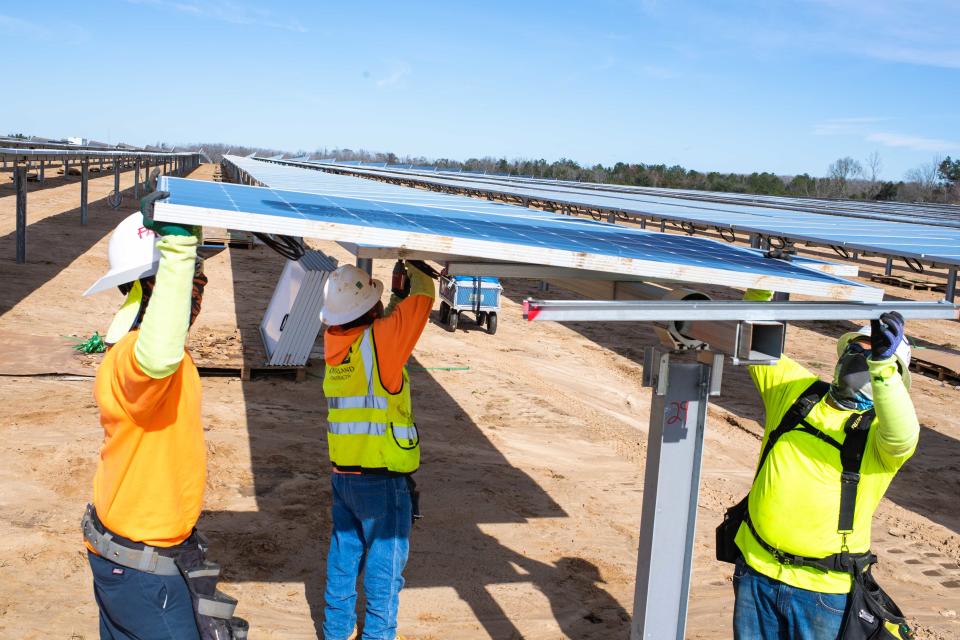Fracking gas is too risky for our climate future
Last month’s polar vortex and other extreme weather events from the past year in Iowa and nationally have shown us the risks of continuing to rely on fossil fuels. As fuel lines froze, large volumes of gas and coal power plants were not able to operate during extreme cold putting millions at risk. Massive power outages caused millions of people, from here in Iowa down to Texas, to survive against the raw elements.
Some suffered and died due to hypothermia, carbon monoxide poisoning, or fires caused by burning their own belongings for warmth. While some renewables were also forced offline, clean energy was largely more reliable than fossil fuels during this crisis.
Extreme weather and natural disasters show us time and again the need for a comprehensive shift to a clean, reliable energy system that keeps us healthy and does not worsen our climate crisis. We should reject claims that renewable energy is less reliable than our dependence on fossil fuels. Our energy grid needs critical infrastructure updates to continue to expand clean energy as the effects of climate change accelerate.
It is time to take a hard look at how to build a more resilient electricity system in Iowa. These moments of extremes are happening more often and reveal how vulnerability leads to injustice. Increasing investment in local distributed energy could have helped prevent the blackouts that affected over 5 million people across the U.S. We can start by adding on-site solar and storage to our most critical community spaces — hospitals, schools, and essential businesses — to offer support and shelter for times of crisis.

It should be clear now that generating more power from out-of-state gas in Iowa is a risky deal. Building more of the same will not fix this problem. It will only make it worse. Fracking gas generates high rates of emissions of methane, a greenhouse gas over 80 times more potent than carbon dioxide. When methane emissions from leaky, unregulated fracking wells are included, gas power is as bad as coal for our planet. Plus, as methane degrades in our atmosphere, it just becomes carbon dioxide. And that does not even include the contamination and depletion of our water supply from fracking.
Pollen season is expanding: If your allergies are more severe, more expensive and last longer, blame climate change
Gas also poses risks financially. We know that more than 80% of large gas plants built today will become uneconomical due to the falling costs of energy by 2035, much like coal plants are today. In Iowa we have seen old coal plants shift to gas only to be demolished ahead of schedule. Roughly 80% of Iowa’s remaining coal fleet is over 40 years old. Iowa can continue to lead on clean energy by retiring coal power, replacing it with clean energy, and saying no to new gas plants. As more coal plants come offline this decade, they must be replaced with clean sources including wind, solar, storage, energy efficiency and demand response tools.
Sen. Capito: Bipartisan transportation bill can propel American economy forward
Wind, solar and batteries are the lowest cost options for energy, and costs continue to decline. We don’t need gas as a "bridge fuel." We are already on our way with wind and solar in Iowa, but we need more investments in clean energy and a clean grid to complete the transition. The Iowa Legislature should reject new state incentives for new gas infrastructure currently under consideration. A course correction to avoid the worst effects of climate change should include cutting fossil fuel use not only from electric power supply, but in buildings, transportation. and manufacturing supply chains.
The extreme cold in 2019 was followed by a "Bomb Cyclone" that melted all our existing snow in days resulting in multibillion-dollar flood damage throughout the state, from which we are still recovering. We need to recognize that these new terms for unprecedented weather conditions are becoming our new normal. Climate change is the greatest challenge of our lifetimes. We owe the legacy of a clean, carbon-free energy transition to future generations.
Katie Rock is campaign representative with Iowa Beyond Coal. This column originally appeared in the Des Moines Register.
You can read diverse opinions from our Board of Contributors and other writers on the Opinion front page, on Twitter @usatodayopinion and in our daily Opinion newsletter. To respond to a column, submit a comment to letters@usatoday.com.
This article originally appeared on Des Moines Register: Climate change answer can't include gas; it's too risky

